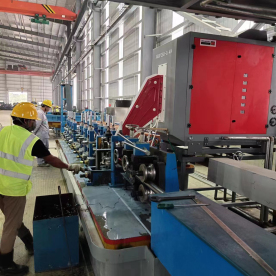[Precision Mould for Tube Mills]Enhancing Efficiency and Quality in Tube Manufacturing: The Role of Precision Mould for Tube Mills
News 2024-9-10
****
Enhancing Efficiency and Quality in Tube Manufacturing: The Role of Precision Mould for Tube Mills
Understanding the Basics of Tube Mills
Tube mills are specialized machinery used to produce tubular products from flat metal sheets. The process typically begins with the metal sheets being fed into the mill, where they are welded and shaped into continuous tubes. The end products can vary greatly in size, thickness, and design, depending on the intended application. To achieve the desired specifications and maintain consistent quality throughout production, manufacturers rely heavily on precision moulds.
The Importance of Precision Moulds
Precision moulds serve as the backbone of tube mills, providing the necessary shape and profile for the tubes being produced. These moulds are engineered to meet exacting standards, ensuring that every tube produced is uniform in dimensions, surface finish, and structural integrity. The use of precision moulds can significantly reduce tolerances, resulting in tighter specifications that are critical for many applications, especially in industries like aerospace and medical, where safety and reliability are paramount.
Advantages of Using Precision Moulds
1. **Improved Product Quality**: Precision moulds help in achieving better surface finishes and dimensional accuracy. This leads to a reduction in defects and rework, saving both time and resources.
2. **Increased Production Efficiency**: Moulds that are designed with precision allow for faster production rates. The seamless integration with tube mills means that manufacturers can produce more units in less time, thereby increasing overall productivity.
3. **Cost-Effectiveness**: Although the initial investment in precision moulds may be higher, the long-term savings associated with reduced waste, fewer defects, and lower labor costs outweigh the upfront expenses. Moreover, improved production efficiency directly translates to increased profitability.
4. **Versatility**: Precision moulds can be designed for various tube dimensions and profiles, accommodating a wide range of customer specifications. This versatility means that manufacturers can easily adapt to changing market demands without significant downtime or re-engineering.

Enhancing Efficiency and Quality in Tube Manufacturing: The Role of Precision Mould for Tube Mills

Enhancing Efficiency and Quality in Tube Manufacturing: The Role of Precision Mould for Tube Mills
The Technological Edge
The manufacturing sector is continuously embracing new technologies, and the development of precision moulds for tube mills is no exception. Advanced CAD software and CNC machining are commonly employed in designing precision moulds, allowing for intricate designs and closer adherence to specifications. Additionally, the use of materials such as high-strength alloys and advanced composites enables the production of moulds that can withstand the rigors of high-speed manufacturing processes.
Challenges and Solutions
While the benefits of precision moulds are evident, manufacturers may face challenges, such as the need for regular maintenance and the potential for wear over time. To mitigate these issues, companies can implement routine inspection protocols and invest in high-quality materials for their moulds. Furthermore, collaborating with specialized suppliers who understand the intricacies of tube manufacturing can lead to better mould designs that are more durable and efficient.
Conclusion
As industries continue to demand higher quality standards and quicker production times, precision moulds for tube mills will play an increasingly vital role in meeting these expectations. By investing in precision mould technology, manufacturers can enhance product quality, drive down costs, and boost efficiency, ensuring their competitiveness in a global market. With ongoing advancements in technology, the future of tube manufacturing holds promising possibilities, driven by the profound capabilities of precision moulds. Whether it's for basic plumbing requirements or advanced aerospace applications, precision moulds are set to remain a cornerstone in the success of tube mills.
